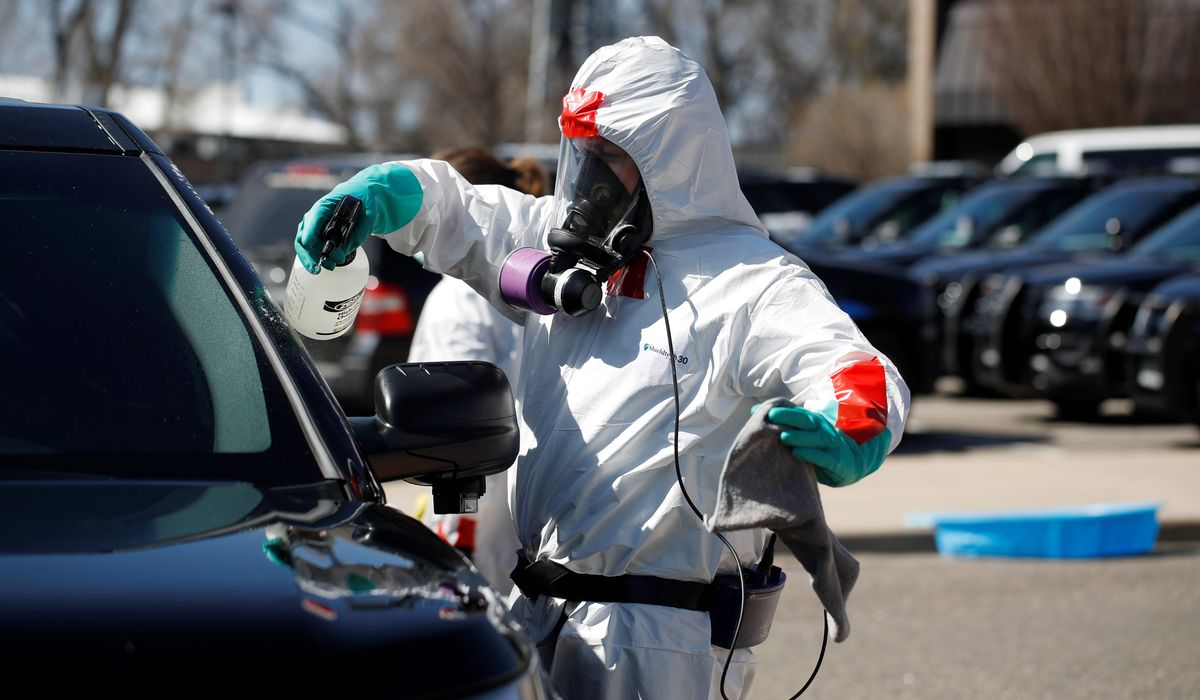The coronavirus crisis is crushing almost every business from Wall Street titans to mom-and-pop shops on Main Street, but business is booming for deep-cleaning companies that can help prevent the spread of COVID-19 and now charge as much as $40,000 per week for their services.
However, some cleaning companies are rejecting jobs that pay tens of thousands of dollars more than their typical work because exposure to the unknown risk of COVID-19 just isn’t worth it.
“If my parents or a good friend ask me to disinfect, I’ll do it. But I’m not using COVID-19 to cash in because my life is more important than a few bucks right now,” said Justin Kufahl, founder of Angel of Mercy Services, a biohazard cleanup business in Wichita, Kansas.
“I’ve treated three or four businesses, and that was a favor to friends. I didn’t even sign a contract because we know so little about [the coronavirus], I didn’t want someone coming back saying I didn’t keep a promise,” he said.
Since the novel coronavirus started to spread across the U.S., decontamination specialists’ phones have been ringing constantly. Schools, restaurants, office buildings, shopping centers and casinos are willing to fork over top dollar for deep cleaning.
John Krusenstjerna, the owner of Iowa CTS, a Des Moines-based biohazard cleaning service, said he receives hundreds of calls a day. In normal times, he averages five to 15 calls a day.
“I operate using my cellphone, and I’ve had days where I’ve had 10% battery life by 11 in the morning because I’ve received so many calls,” he said.
The thinking is that deep cleaning could prevent the spread of the coronavirus that causes COVID-19. The virus is transmitted through droplets released when an infected person sneezes or coughs. Those droplets then stick to surfaces from several hours to days, health specialists say.
A deep cleaning can decontaminate surfaces harboring a virus that spreads so easily from person to person.
Scientists release new information nearly every day but still have few answers about how the virus works. Because of that uncertainty, some decontamination services are selective about the jobs they take.
Mr. Kufahl’s company cleaned up contamination from the Ebola virus, which causes severe hemorrhagic fever, but he is steering clear of the new coronavirus.
“Ebola was different because it was cleaning up blood and bedding, but that didn’t spread as easily as COVID-19,” he said. “I don’t know how many people have it, and what I’ve read about the virus seems to contradict itself. Whenever there is that much uncertainty, you are risking your life and your business.”
Mr. Krusenstjerna also worries about a lawsuit if someone catches COVID-19 after a cleanup, perhaps from an asymptomatic carrier who recontaminates a site.
“It scares me not on the cleanup side, but the liability side,” he said. “If you go to court, how are you going to defend yourself? How am I going to validate our process protocol with the coronavirus?”
Mr. Kufahl said he hasn’t done any marketing at all for COVID-19 decontamination, but that has not stopped his phone from ringing.
Scott Vogel, owner of Emergi-Clean based in Linden, New Jersey, said his company is selective because he needs to focus on those who need his services the most.
Mr. Vogel’s business is in the North Jersey-New York metropolitan area, the epicenter of the nation’s COVID-19 outbreak.
His business works with first responders dealing directly with patients who have a high risk of exposure. He has turned down requests from businesses to deep clean offices that have been shuttered because that is not an immediate need right now.
“At this point, we are deciding based on the essential aspect of it,” he said. “If I am putting my guys at risk, we are going to need to decide if it is essential or not.”
The selectivity is not entirely about safety, the business owners said. Equipment needed for the kind of decontamination necessary to kill the coronavirus also is in short supply.
The high demand for cleaning equipment has set off bidding wars, said Mr. Krusenstjerna. He has received offers of $1,000 for a $6 gasket necessary to run cleaning equipment, he said.
He turned down the offers.
“I don’t feel right selling it because I know that he is going to use it to take advantage of someone,” he said.



















